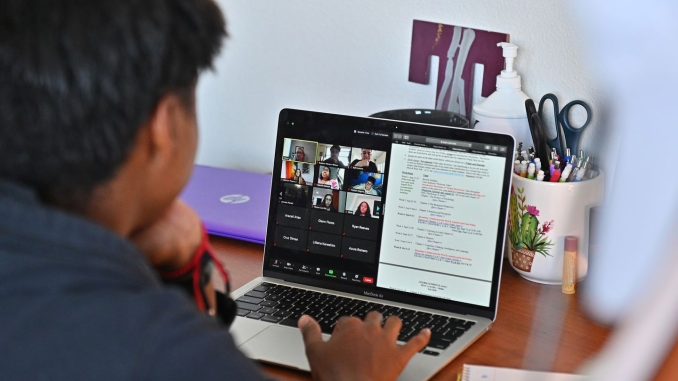
By: Helen Dang
During the middle of the 2020 spring semester, all Brooklyn College students had to transition to remote learning. With COVID cases rising, I remembered having to leave the gorgeous Brooklyn College campus and take all of my classes in my parents’ house. Lovely as it is, it grew cramped quickly. I hated doing my work remotely, I missed the in-person structure of school, and I wanted to go back very soon after it all began.
Throughout this long and difficult process, however, we have all learned to see education from a new perspective. After almost two years of weighing the pros and cons of both in-person and remote learning, most students have answered for themselves which might be best for them. The important point for us to realize, however, is that because all of our answers will vary, the need for a choice between the different options has become readily apparent. To reach my own answer, I had to examine the pros and cons between the two types of learning.
One of the biggest benefits of in-person schooling for me were all the lessons that I learned from the environment and people around me, not just in the classroom. The biggest drawback of in-person learning for me was that sometimes I couldn’t focus on my lessons and missed some stuff the professor had talked about. This could happen simply by sitting in the wrong spot of the classroom where a radiator might be clanking or a classmate couldn’t stop clicking their pen. It is this large con of in-person learning that is no longer a bother for me in a virtual setting, where I am able to focus on my lessons and have access to all the material I am learning through recordings.
Online learning certainly has its cons for me as well. Key among them is the lack of connection and bonding with my peers and professors, which is especially true considering that some professors used this new mode as an opportunity to be lazy and assign more homework than teach. Some students may not turn on their cameras or are completely silent in online classes. Nonetheless, there is still some sort of bonding that can occur, but it is a very different type of connection formed by getting to know how somebody acts online or by the glimpses into their home if they use their camera. Between the two, I believe in-person allows for a much stronger connection with professors and peers, who you get to know more authentically than if all your meetings were remote.
Throughout this worldwide transition to remote learning, nearly every student has experienced an entirely new point of view toward education.
Starting from kindergarten, I have been subject to the traditional in-person mode of education. This meant that I was mandated to go to school every day I had class, sit at either my assigned seat or my go-to seat, learn from instructors, and do assignments at home or crammed in between courses. All of which forms part of a long-standing daily routine for much of the western world revolving around education.
The pandemic has put a full stop to this routine and has presented me with a new point of view on education through remote learning. At first, I hated it. But as COVID trudged on, I began to accept the changes that came with remote learning and have come to appreciate the benefits of it. Chief among them is my ability to focus better through what feels like more individualized learning. While there are clear reasons why this might not be preferred by everyone, it certainly helped me learn better and remain focused.
After reflecting on these pros and cons of both in-person and remote learning, I have come to understand that I am the type of student who learns better remotely. We all have learned something about ourselves as students throughout the pandemic. For me, I have come to realize that because of how they help me remain focused, online classes allow me to be a better student than taking classes in-person. Because we have all come out of this experience with a unique preference, the school needs to recognize the need for choice. Whatever a student’s preference might be, it has become clear that we must have options for students who learn better in different settings.
